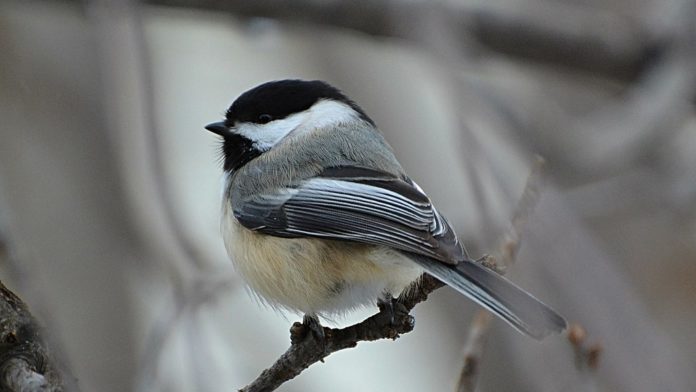Fearful, traumatic events can leave a lasting psychological imprint on the brain, sometimes resulting in Post Traumatic Stress Disorder (PTSD). As it turns out, this phenomenon may not be exclusive to humans.
PTSD inflicts significant and potentially permanent changes to the brain’s circuitry that can lead to a number of behavioural shifts that characterize the condition. PTSD sufferers can be easily upset or frightened, experience flashbacks or severe emotional distress, and avoid places and people that trigger memories of the event.
New research out of Western University suggests that prey animals may experience a similar process following traumatic experiences with predators.
Exposure to distressing audio led to lasting behavioural changes
As part of their investigation, the team chose wild-caught black-capped chickadees as their subjects and conducted their research at Western’s Advanced Facility for Avian Research. The birds were separated and exposed to audio recordings of either predators or non-predators for two days before being allowed to mingle in a common area again for a week.
After the week was up, they were once again separated and exposed to alert calls recorded from black-capped chickadees that did not participate in the study. The decision to expose them to alert calls and not simply repeat the predator or non-predator recordings was important for the study design because it showed that the birds weren’t just responding to a specific predation cue, but to a general indication of danger.
Fearfulness was gauged by examining how much time each bird spent in a ‘vigilant, immobile’ state (i.e. the ‘freeze response’) following exposure to the alert call. Birds who had been exposed to predator sounds at the start of the study displayed signs of hypervigilance — a key indicator of PTSD in humans.
Long-term effects on neural circuitry were measured by analyzing the presence of FOSB protein levels in the amygdala, where fear is processed, and the hippocampus, which is involved in memory formation. Both of these brain areas are involved in PTSD in humans. The FOSB protein is a transcriptional regulator, which means it functions as a switch for genes, and it is also known for having long-lasting effects.
Through this analysis, the team found that the fight or flight response was still measurable a week later despite peaceful conditions for the birds during the time in between. Lead author Liana Zanette and her colleagues are the first to show that this response may last far longer than the initial interaction between predator and prey.
Another finding was related to the concept of fecundity, which concerns reproductive potential and an animal’s ability to care for their young. In the paper, the authors cite previous work by ecological researchers which shows that predators may affect prey animal numbers not just through killing them, but by affecting this reproductive element.
“Importantly, it was the responses of more fearful parents to entirely naturally-occurring predator cues, over these three weeks, which evidently led to the deaths of their offspring,” say the authors.
Findings significant for mental health and other disciplines
In evolutionary terms, having PTSD as a survival mechanism makes a lot of sense. Psychological trauma can act as a driving force to ensure a creature will stay away from a threatening place or type of predator in future. Despite the horrendous effects of PTSD, this mechanism would have emerged in a context where survival was prioritized over quality of life.
The authors noted that biomedical researchers are increasingly recognizing that, for humans, PTSD is something of an evolutionary hangover. By exploring commonalities with the animal world, we may be able to shed light on the condition’s root causes, and thereby understand the complex nature of triggers or develop effective treatments.
“These results have important implications for biomedical researchers, mental health clinicians, and ecologists,” commented Zanette in a University of Waterloo press release. “Our findings support both the notion that PTSD is not unnatural, and that long-lasting effects of predator-induced fear with likely effects on fecundity and survival, are the norm in nature.”








































